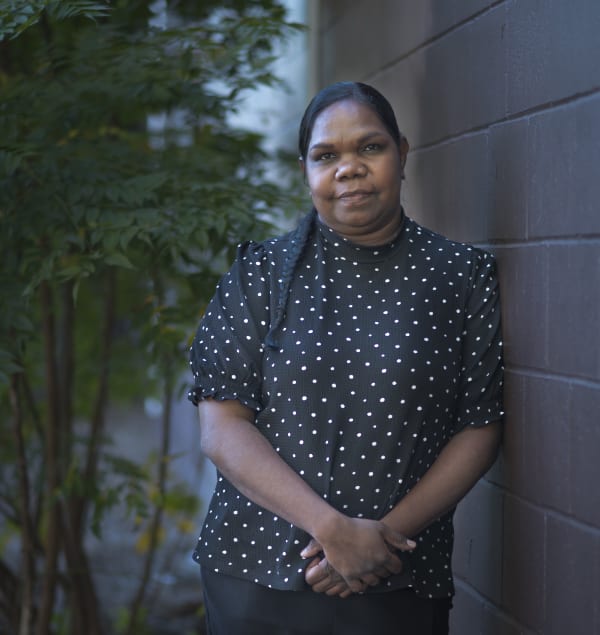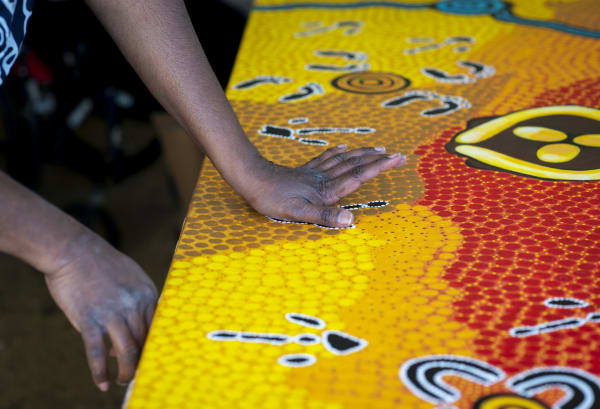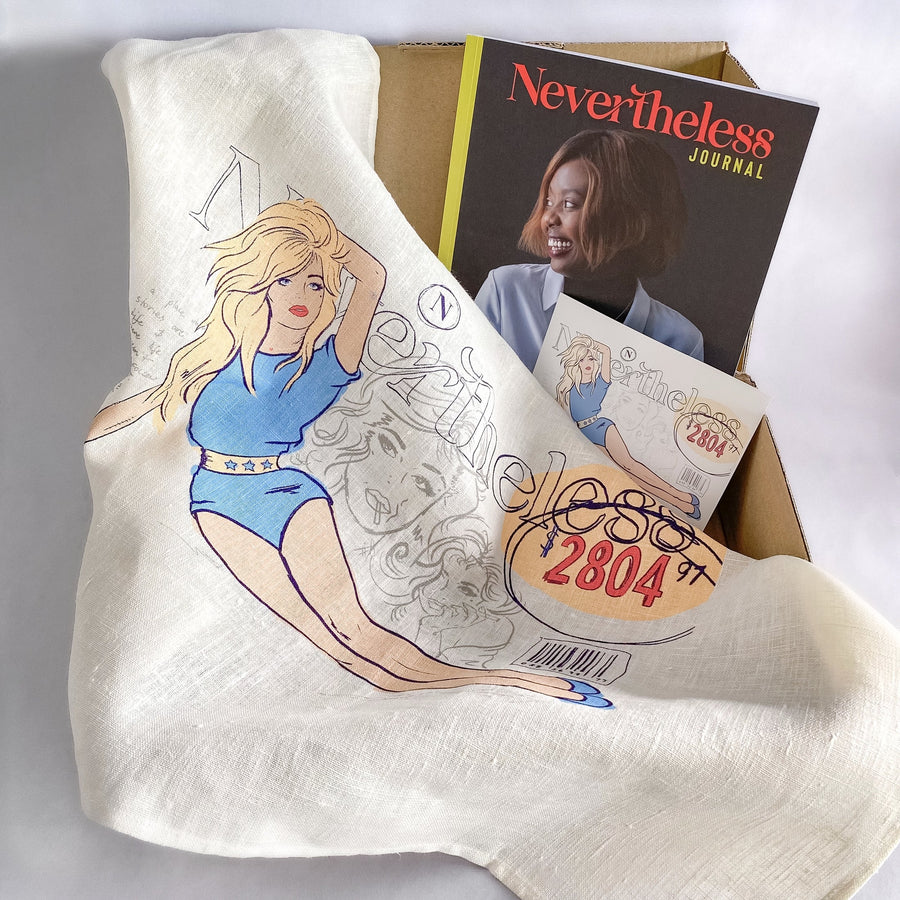The Unbroken Spirit: Ena Sam and Colleen Sam

Words Natalie O'Driscoll
Images by Simone Gorman-Clark
Colleen Sam is a Kalkadoon (Kalkadunga) woman; an artist who tells the stories of her ancestors through paint and film and children’s books. The stories of her ancestors have been passed down in an unbroken line, keeping the Kalkadoons one of the small percentage of remaining continuous Aboriginal traditional owners who are still connected to their origins, a strength that has seen this small community overcome displacement, invasion, massacres, segregation and racism and come through the other side with what she refers to as a “knowing”; that critical spiritual connection to country, lore and their first ancestors that sits at the very centre of all Aboriginal culture.
“With us, to understand our dreaming stories is to know our spirituality, our true ancestral connections back to our first ancestors and our country and that instills knowledge of who we really are and our responsibilities,” says Colleen.
“To understand your ancestors’ story and also where you came from and the make-up of your country and our connection with it.”
“With traditional knowledge it’s not just placing yourself as an Aboriginal person. Even with the stolen generation, it’s not placing yourself with the country you were taken to, you have to go back to your blood lineage and connection to your ancestry and the spiritual connection back to your ancestral country.”
Colleen sits with me, showing me a rough map of Kalkadoon country which goes from Sacred Mountain in the north to Cloncurry in the East and Camooweal in the West and a little way past Dajarra to the south. She is softly spoken, with extremely long hair tied back in a plait. Her mother Ena, equally as softly spoken, sits in a wheelchair opposite us. She interjects only occasionally, but when she does, everyone stops to listen.
Make no mistake, as quiet and composed as they are, these women have backbones of steel, forged through the fires of racism, from years of adversity and fighting for their place in the world, strengthened by the weight of the long lineage they carry around in their bones.
>>> Shop all things Nevertheless
Ena grew up in a rural compound on Kaiser Creek outside of Camooweal with other Kalkadoon families. Her parents grew up along the Georgina River in the 1930s.
Before that Ena’s family had originated from Central Kalkadunga Country around Calton Hills where her people were massacred and captured by European settlers and then forced to work as slave labour on numerous stations before lastly working on Yelvotoft Station.
That’s where Ena was born. In 1975 the local council moved the segregated Kalkadoon families into the township of Camooweal where they lived for five years, before moving to Mt Isa when Colleen was very young.
“Mt Isa was very racist,” says Colleen.
“The full blood people weren’t allowed to move around freely. My aunties and uncles who gave us shelter from the cold and rain fought for a reserve called Yallambie to be built for us Kalkadoons and it’s still a reserve there today.”
Escaping the daily racism, threats and physical violence was the impetus for a move south to Brisbane, the specific catalyst for which was the severe violence inflicted upon on their family members.
“Mum’s uncle was grabbed one night walking along Duchess Road back to Yallambie and got dragged along behind a car,” says Colleen. “And she told me she went to visit him in the hospital and all his skin on one side was peeled. She always told our stories when I was growing up the bad and the good and also how to handle it.”
Bundling four adults and seven kids into an old Ford Falcon, the family drove down to Brisbane, moving into the Opal Hostel at Eight Mile Plains before settling in Logan.
“Logan was good at first but the racism was happening all the time, it didn’t really start changing until the 90s,” recalls Colleen.
“Right up until the 2000s we had a tension in our body, a real tension any time we were out. At home in our house we were relaxed, but as soon as we got ready to go down that road, we went into another skin, like we were expecting it.
“When we moved to Upper Mt Gravatt in 2007 everything just changed and in Sunnybank too, suddenly we could just walk around without thinking about it. Just feeling so relaxed.
“I said to my two daughters they’re so lucky – you can feel it in their bodies, they don’t have that tension. When I was growing up it was so different. But knowing your culture played a really good part in keeping me strong. That’s the unbroken spirit part of the culture.”

Colleen credits that “knowing” with keeping the whole family strong during their various trials.
“You hear stories about abuse and addiction,” she says sadly. “We’ve never had any of that in our family. We’re strong. Even through all our trials all my family and relatives looked after each other and the children were always happy and cared for. It goes all the way back to the Kalkadunga warriors that fought for us.”
A story passed down from Colleen’s great-great-grandfather King Jimmy is that the white men would use the Kalkadoon children as bait, by tying them to trees or locking them in cages in order to lure the men down from the mountain When the Kalkadoon men would try to rescue the children they were shot dead, giving their lives to save their families.
“Some Aboriginal people are broken because they’ve got no knowing of where they’ve come from and even might have been placed somewhere else. You can feel it within the spirit. It’s a loss. Not having a real clear understanding of who you are as an individual, it’s not a full knowing of your being.”
This is where Colleen’s exhibition ‘My Story: The Unbroken Spirit of the Kalkadoons (Kalkadunga)’ comes in. The series of works responds to her family’s story, which has been passed down in secret from generation to generation.
The stories trace the experiences of her ancestors, beginning with King Jimmy and Queen Nellie – senior law man and woman of the Kalkadoon people, and the next three generations of her family.
The stories tell of how they fought to survive, and protect their culture through invasion, the battle of Battle Mountain, violence, captivity, forced labour, restriction of movement, segregation, stolen wages and racism.
“Our family has never publicly shared or recorded these stories before,” explains Colleen. “However we feel it is the right time to share these stories now.
“We believe telling these stories through art, design and film creates an important resource for the younger generations.
“A big message from our stories and artworks is to celebrate our culture’s resilience but also to convey our forgiveness and to initiate processes of healing and reconciliation with the wider community.”
Ena speaks up.
“It’s not a good thing to carry anger and not good thing to hate a person. But we do feel like the truth needs to be told. Hate is a really strong negative emotion and bad word. We let it go. We know down the track we’ve got nothing to be angry about but the people who put all this grief on us, they’re the ones dealing with their own hatred themselves.”
This reminds Colleen of a something her mother said to her when she was small.
“I was experiencing so much racism at school, and these white kids were just so angry all the time. Angry at me for just being there. And I asked my mum about it, because in my mind we were the ones that had been wronged, so I couldn’t understand why they were all so angry with me. And mum said ‘It’s because they don’t know who they are’.”
As we talk, Colleen opens up an artist’s portfolio and brings out various sketches, images, photographs for us to peruse. Some are drawings of their family stories created by Ena when Colleen was very young sitting at her mother’s feet with the other kids, learning about their mob. The elongated, shadowy figures and tree-filled landscapes are highly reminiscent of Colleen’s own work. It’s clear where she gets her talent from.

For those who believe that colonisation is only a part of Australia’s history, Colleen says:
“We’ve lost most of our Country because of Native Title. There’s legislation still being placed upon Aboriginal people and culture that is forcing more change and loss. So colonisation is still ongoing."
“There are too many people following government legislation that don’t have the cultural knowledge about respecting each other’s tribal boundaries, cultural knowledge, intellectual property, languages and the Dreaming System which is our lore given to us by our God and Creator and governs our responsibilities in order to look after everything in nature and each other.
“You need people in power that understand the system, or you’re going to be the cause of more damage and loss of culture, rather than a force for good.”
In 2017, Ena was hospitalised for more than a year with a serious condition, and was nearly lost to the family. But she bounced back, and surprisingly, came out of the illness with long-lost memories of lost a Kalkadoon words, and clearer memories about the stories.
“That whole situation made us start thinking about how we’re going to preserve all that knowledge,” says Colleen. “That’s when we started doing recording and planning the exhibition.”
Colleen believes that education is a key part of reconciliation.
“Education is important. Already we’ve seen a difference in people trying to understand our culture, starting to respect it more, and that’s because of education. When you understand someone it makes it harder to see them as an enemy.”
Be the envy of your mates by grabbing a stunning print edition of Nevertheless to show off on your coffee table. And never miss a story by signing up to our email list.


